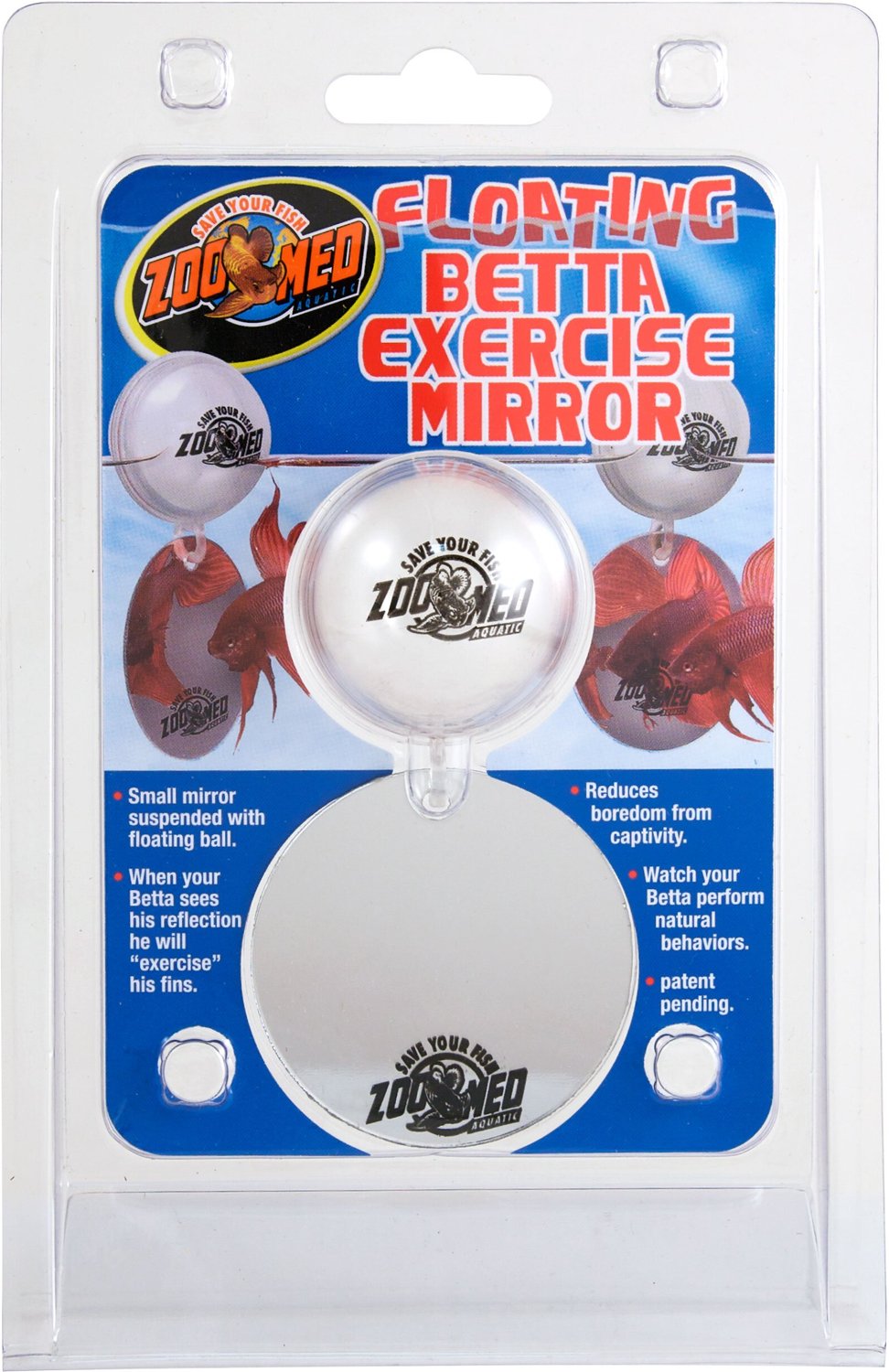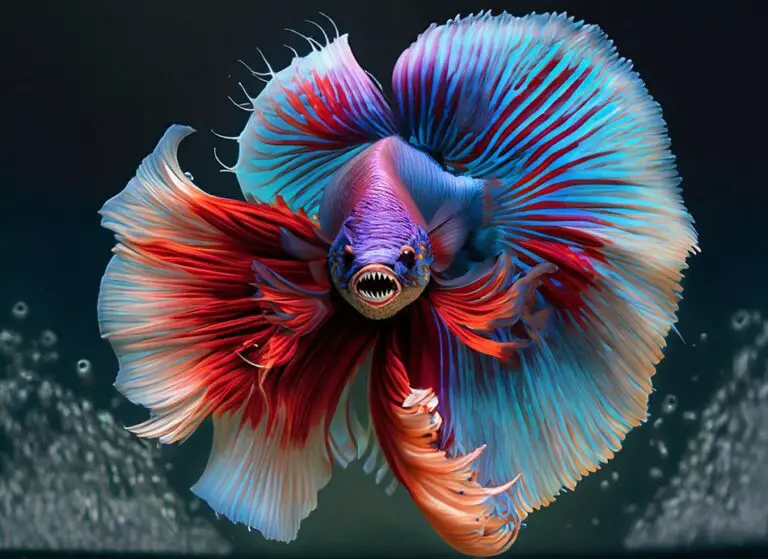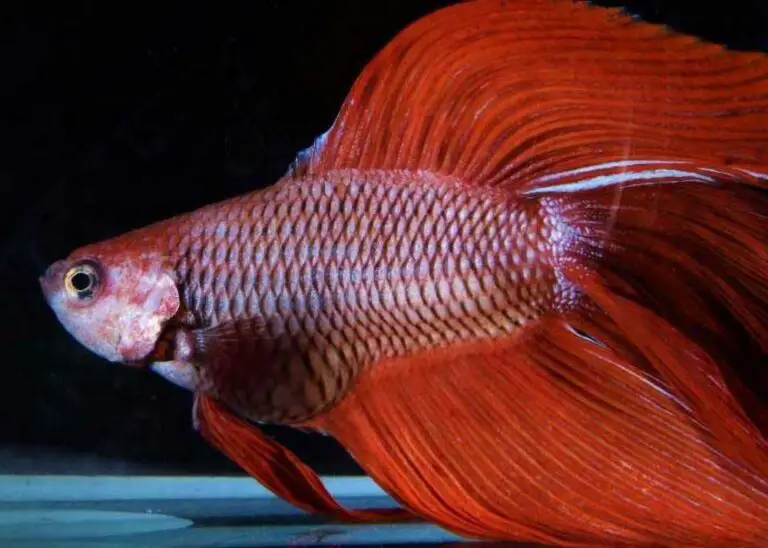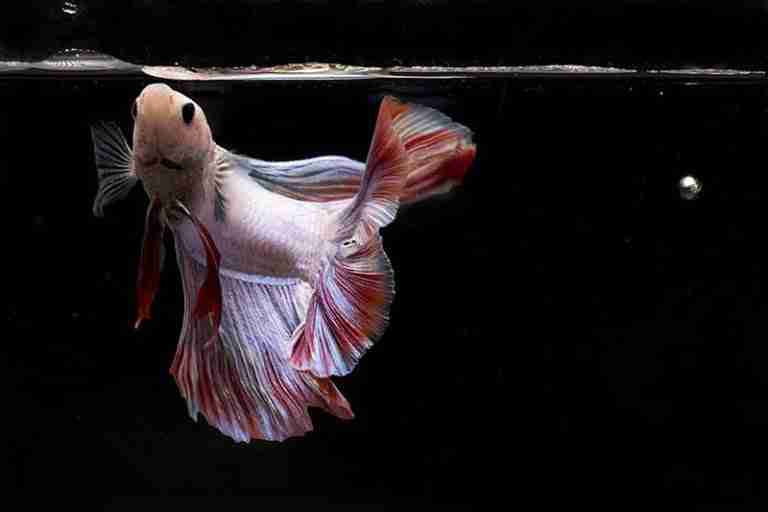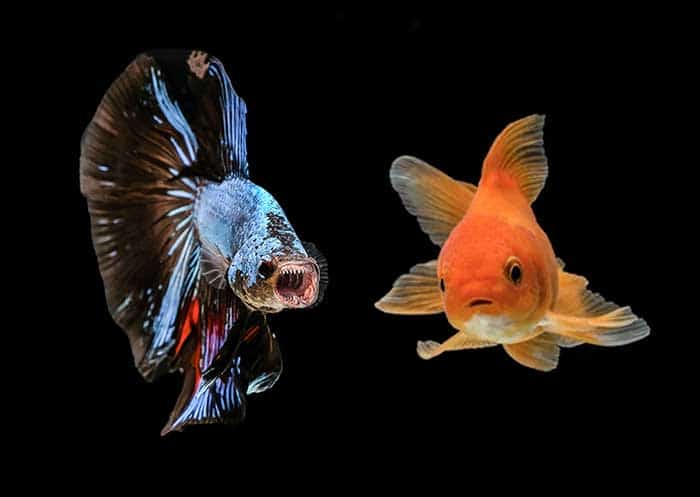9 Common Reasons For Angry Betta Fish
Betta fish are mostly placid and peaceful fish, but they are also known as Siamese Fighting Fish for a reason. Bettas are prone to temper tantrums, and you will definitely know when you have an angry betta fish on your hands.
Betta fish can be angry if they don’t have enough room to swim, if their territory is threatened, or even if they aren’t fed on time. An angry betta flare is enough to show you how they feel as they flare their gills, spread their fins, and swim erratically around the tank.
Angry betta fish can also develop stress stripes when they become agitated over long periods which appear as dark horizontal lines and are a great indicator that your betta fish is unhappy.
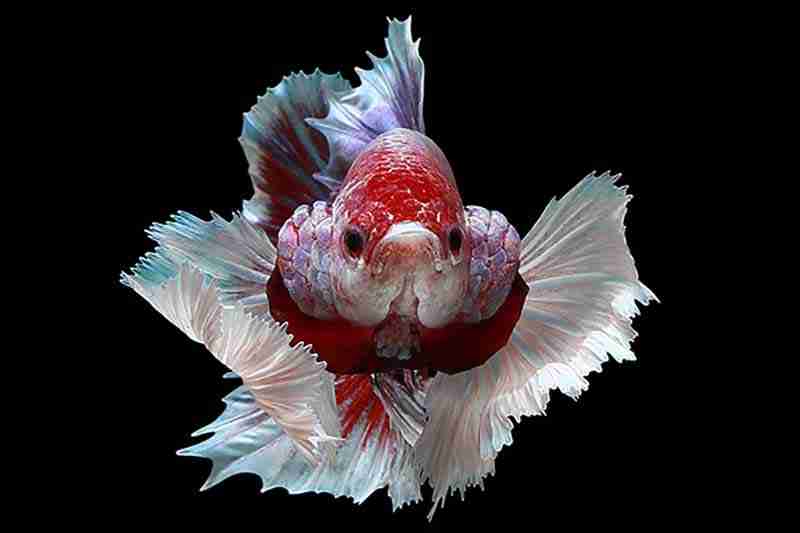
The rest of this article will discuss some common reasons for angry betta fish and how not to make your betta fish angry. I will also provide a few tips to improve your betta’s mood.
Common Reasons For Angry Betta Fish
If you are asking the question, “Why is my betta fish so aggressive?” there are a number of reasons why this may be the case.
Some of the most common reasons why betta fish get angry are:
- Being kept in a small space – Bettas need room to remove themselves from threatening situations.
- Non-compatible tank mates – Their tank mates are too boisterous and don’t respect boundaries.
- Territorial aggression – Male betta fish flare aggressively when their territory is invaded or under threat.
- Seeing their own reflections – A betta will often flare at its own reflection.
- Boredom – Lack of activity and stimulus that they need for mental stimulation. Betta fish need to release their energy or will show aggressive behavior.
- Keeping more than one male betta in a tank – If you really want to make your betta fish angry, this will be a fight waiting to happen.
- If the tank water is too warm – The water temperature for betta fish should remain consistent. Water that rises above the normal temperature will increase its activity, and your betta can get angrier than usual.
- If you feed them the wrong type of food or too little – A hungry betta will let you know its displeasure.
- If they have a disease and it is left untreated – A betta that is unwell can be irritable, angry, and stressed out.
These are the most common reasons why your betta may get angry, so let’s take a look at them in a little more detail.
Do Bettas Like Small Spaces?
Many people believe that betta fish like to live in small spaces. This belief is because bettas are often found in shallow puddles in their natural habitat, but this is not completely accurate. Betta fish do not like small spaces, and they may become more aggressive if they feel too confined or exposed for any length of time.

Yes, these puddles are shallow, but they join together and form a much larger body of water, creating a big enough space for many betta fish to live without too much difficulty.
It also doesn’t help that many pet shops and fish stores sell funky-looking betta tanks that are often far too small for a betta to live comfortably.
These tanks also have little or no filtration system, which will make living in them an unbearable and stressful experience for your fish, not just because it’s an unnatural habitat, but because the water quality will be appalling.
Betta fish that feel confined may become aggressive and flare more often because they have nowhere to retreat and will feel constantly exposed.
Can You Put Betta Fish With Other Fish?
You can put betta with other fish, but you will need to do some careful research. You will need to know the temperament of your betta and what kind of fish will live peacefully with them. Betta fish have gained quite a bad reputation, but they are generally good-natured unless threatened.
If a betta has been housed alone for an extensive amount of time, it may become aggressive toward new tank mates, so it’s important that its tank is large enough and contains plenty of hiding spots so that it can retreat when feeling threatened.
If you are thinking of adding other fish to your betta’s home, the tank should be at least 20 gallons in size, and this should be large enough to add some plants or ornaments to provide some cover and give your betta some security.
Make sure that any new additions have a peaceful temperament, or they may be at risk of being nipped, bullied, and constantly harassed by your betta. Because betta fish do have small teeth, they can cause damage to other fish with delicate fins.
Boisterous fish are also not ideal to put with bettas because they probably won’t respect boundaries, which will also annoy your betta and cause further aggression.
When you put more than one male betta in a tank, they will likely fight, and in the worst cases, betta fish fight to the death, especially if their space is not big enough and there are not plenty of hiding spots, so it’s simply not worth taking that risk.
Compatible Tanks Mates For Betta
There are numerous fish that will likely be compatible with your betta, but I will give you a shortlist to get you started:
- Guppies
- Mollies (although molly fry may become a snack for your betta).
- Corydoras Catfish.
- Tetras such as: Harlequin, Neon, Diamond Tetra and Cardinal Tetra.
- Rainbowfish.
- Snails (such as Mystery Snails).
- Dwarf Gourami’s.
- Bristlenose Plecos.
Whenever housed with new tank mates, you should always watch your betta fish, when they are mad, they will let you know.
Look for the signs I have outlined throughout this article (flaring, hiding, not eating, etc.) you may need to remove your betta fish before any fighting occurs.
Betta fish can be housed with small peaceful species of similar size, but you must research their natural habitats, water conditions, temperament, and if they are likely to fight.
If you have done your research correctly, you will enjoy a happy fish with peaceful community tank mates that can coexist harmoniously together.
Non-Compatible Tank Mates For Betta
If you are sure you want to add some tank mates for your betta and want to avoid any fin nipping, excessive flaring, general aggression, and fighting, you will definitely want to stay away from this shortlist for non-compatible fish:
- Danios.
- Goldfish (many varieties).
- Barbs, especially Tiger barbs or any aggressive fish that is known to nip at the fins of other fish species.
- Cichlids.
- Angelfish are usually too big and will definitely pick on your betta until they make them go belly-up!
- Dwarf Gourami.
- Other male bettas.
The fish above can be quite territorial and will probably have an aggressive response toward your betta, and some of these fish are much larger in size, so your betta won’t stand much of a chance.
When I first owned a betta, I didn’t do enough research, so I put him in a community tank with two Angelfish, two Gouramis, and several smaller fish, including Neon Tetras and Guppies. Overnight my betta was completely stripped of its plumage and died within a day of this. On adding a second betta, I found the Angelfish a huge predator toward my betta and promptly removed him to a smaller tank.
Territorial Behavior In Betta Fish
Betta fish flares are a defensive reaction to something the betta feels threatened by. Flaring is a common and natural behavior caused by the betta’s highly territorial nature. The reason bettas are so territorial stems from the need to protect their food source and in the wild. The same aggressive behaviors can be seen when a male is trying to defend his mate or feels threatened by another fish in his territory.
Territorial behavior will vary between sexes, but both males and female betta fish may show aggression toward other same-species bettas as well as other fish.
Betta flaring
It is a common misconception that betta flares are limited to males, and despite their lack of plumage, female bettas can and will flare their gills in the same way as their male counterparts. So why do betta fish flare their gills?
A betta fish flaring gills will look much larger to a potential threat. Their gill flaps will open wide, and the male bettas will extend their fins as much as possible. A betta fish flare can look quite intimidating, especially from the front, as you can see in the picture below.

Many betta owners are worried that flaring may not be good for their health and can be a sign of an overly stressed fish. So is your betta flaring good or bad?
If you find your betta fish flaring a lot, there is usually a good reason for it, and whatever the reason, it may be causing your betta to become agitated and stressed. If you remove the cause, you may find your betta will stop flaring so much.
Occasional flaring is nothing to be concerned about, and the act of flaring will not cause your fish any harm at all. Some betta will flare to stretch their muscles, some will flare when constipated as it helps pass the blockage, and for some, it will just be down to their own personality. The worry of too much flaring should always come down to why the behavior is occurring.
Will Betta Fish Attack Their Own Reflection?
We have already covered a few times that bettas are territorial and will often attack their own kind when they feel the need to protect their space or a mate, so will a betta fish attack its own reflection?
Betta fish are pretty intelligent, but they will not understand the purpose of a mirror and certainly won’t realize what they see in a mirror is only a reflection of themselves. Because of this, betta fish will attack their own reflection as if being threatened.
Is A Betta Mirror Good Or Bad?
Are betta fish and mirrors a good idea? If you see your betta fighting its reflection, this is obviously a lot safer than fighting another betta. Mirrors are a harmless way to help relieve your betta from some of that aggression it is carrying around. If you have a betta that is showing signs of aggression, I would highly recommend using a mirror.
Zoo Med is one company that sells floating mirrors, especially for betta fish. They are not expensive, and I have left an (affiliate) link to one of these mirrors below.
I have another post that talks about the use of betta mirrors, which also talks about other toys that you can use to bring some stimulation to your betta fish.
Betta Glass Surfing
Glass surfing is where a betta fish can see their reflection in the tank sides and will begin to flare its gills running up and down along the length of the tank, trying to warn off its own reflection. Bettas are more likely to see their own reflection in the tank glass when the tank itself is brighter than the light outside of the tank.
If you notice your betta glass surfing a lot, don’t be alarmed, as it is harmless in most cases. If the glass surfing is causing your betta to swim erratically, ensure there are no sharp rocks or decorations in the tank to avoid injuries occurring.
Do Bored Bettas Become Aggressive?
Boredom can play a big role in your betta becoming angry and aggressive. If your betta tank is too small and provides little room for exercise, there will be a lot of excess energy building up, which often plays out through aggressive behavior.
A bare and sparsely decorated tank may also lead to your betta fish becoming bored and being so far away from what it’s been used to in the wild, their natural instincts need to come out at some point.
There are many ways to stop your betta from becoming too angry or aggressive, and providing a well-planted/decorated tank with plenty of space to swim freely is the best way.
I often keep a small amount of live food in my betta’s tank, such as freshwater scuds or brine shrimp. Your betta fish shouldn’t become fat because he will have to hunt for the shrimp, giving him plenty of exercise, and it should keep him entertained.
Alternatively, betta fish enjoy some mental stimulation, and there are many betta toys available on the market to address the issue of boredom.
Amazon stocks a wide variety of betta toys which you can find here.
Music has also been known to stimulate betta fish due to the vibrations they feel through the water. You can read my post titled “Do Betta Fish Like Music? You’re About to Find Out!” if you are interested in finding out more about this.
Can You Keep Two Male Bettas Together?
This has been covered several times throughout the post, but I felt it deserved a special mention. The aggressive nature of betta fish has been noted since people began collecting them throughout the 19th century.
Because of their aggressiveness, betta’s were often used for gambling, and although fights did not always end fatally, a losing betta would be the one that retreated first.
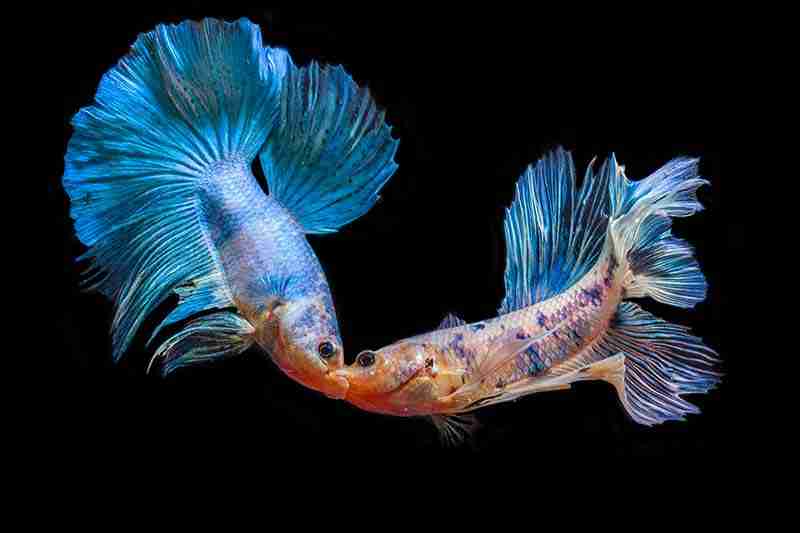
Knowing this information clearly demonstrates that these fish shouldn’t be in the same tank together. The same is true for female betta fish, but usually, there must be a reason for fighting to occur unless it’s just general aggression, breeding habits, or territory issues.
If you have a partitioned tank housing many betta fish, it is important to block their line of sight into the adjacent tanks. All a betta needs is another betta in view to become aggressive and angry.
If you must house 2 betta’s in the same tank, you must ensure there is plenty of room for both to escape a potentially dangerous situation, and there must be ample hiding places.
Both a male and female can be housed together during mating, and the female should be removed once eggs have been laid, leaving the male betta to tend to the nest.
Why Do Betta Fish Fight
Betta fish fight to protect themselves and their territory. A bettas territory is all they have, and they will instinctively protect it. Betta fish use their territory to invite a potential mate. It is where they build their bubble nest, ready to breed, and they are fiercely protective of their unhatched young.
When two male bettas can see each other, they become defensive, and each will assume the other is trying to steal their territory, their female mate, or potentially wants to kill their young. The first instinct is to fight.
The average lifespan of a betta fish in the wild is much less than that of a betta in captivity, and this is often because of fighting. Bettas live for around 5 years in captivity and as little as 2 or 3 years in the wild.
How Do Betta Fish Fight
When betta fish fight, they will first perform their ritual of fin and gill flaring, which I have already discussed. Flaring is an attempt at intimidating the other into backing down, but betta fish are bold and rarely back down from the other.
Bettas will usually chase each other around the tank, to begin with. They will swim at each other aggressively, often butting heads, and they bite at each other’s delicate fins, causing tearing.
Betta fish have powerful jaws and tiny sharp teeth, which are harmless to humans, but they can cause serious injuries to other fish. Betta fish can clamp down hard on the delicate fins and tails of their opponents, not letting go until it’s torn away.
Betta fish don’t usually die from the initial fight, but injuries sustained in the fight can become infected and, if left untreated, can cause death.
Does Water Temperature Affect A Bettas Temperament
Yes, the water temperature does affect a bettas temperament to a degree. The ideal temperature for betta fish is between (78-82°F/26-28°C). Colder water will slow a betta down, making it more docile, while warmer temperatures can make it more aggressive and angry.
Betta fish can survive without any issues in slightly warmer or colder temperatures, but it will affect certain parts of their biology, such as their metabolic rate (how quickly they burn energy), and a higher metabolism brought on by warmer water temperatures can increase aggression.
Do Betta Get Angry When Hungry
A betta will get frustrated and more aggressive if they are not getting the diet they need, however, this is down to the individual betta. They are picky eaters at the best of times but need a diet high in protein, or they will lack energy and suffer from poor health. This by itself is enough to cause a betta to become a little cranky.
The best way to avoid your betta from becoming angry would be to feed your betta at least once or twice a day and feed them an amount they can consume in around 30 seconds each feed until satisfied.
Do Sick Bettas Get Grumpy
A betta that is feeling under the weather will either become quite lethargic or show signs of frustration by flaring and other signs of aggression. If your betta is acting in a semi-aggressive way, you should look for any visible signs of illness and check the tank’s water parameters.
Betta’s don’t usually get aggressive without reason. If it progressively gets worse and lasts for more than a day or two, especially when there have been no significant changes to your betta’s environment, your betta is likely suffering from some form of illness that will need treatment.
How To Calm A Stressed Betta Fish
If your betta fish is very stressed, over time, this will not be good for their health. If you can identify the exact cause of the stress, you will be in a better position to calm them.
If a betta fish is stressed from illness, you should treat them. A betta that is stressed by other tank mates can be moved. Hungry bettas can be fed. If you are unsure of the cause of your betta’s stress, try to add toys to distract them or play some music, as I described earlier.
It is rare that you will have a betta fish that is angry and stressed for no reason at all, so there should always be a way to calm them down. The more you know your betta, the better you will understand what they like and dislike.


